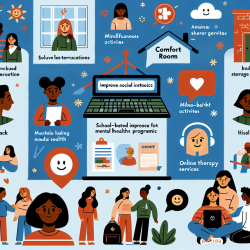Attention Deficit Hyperactivity Disorder (ADHD) is one of the most common childhood mental and behavioral disorders, affecting 3.0–7.8% of the general population. A core deficit in executive function (EF) is associated with ADHD, which predicts poorer academic and occupational functioning. Given these challenges, early intervention targeting EF impairments is crucial for preventing long-term negative outcomes.
Recent research by Shuai et al. (2017) explored the efficacy, feasibility, and acceptability of a cognitive training program targeting multiple EF components and involving parent support as a nonpharmacological intervention for children with ADHD. The study involved 44 school-age children with ADHD and their parents, who participated in 12 sessions of EF training over 12 weeks.
Key Findings
- Neuropsychological Improvements: Post-intervention, children with ADHD showed significant improvements in EF tasks, including inhibition, working memory, and shifting. These improvements matched the performance levels of healthy controls.
- Behavioral Improvements: Parents reported significant reductions in ADHD symptoms and behavioral problems, as measured by the ADHD rating scale-IV and Conners’ parent rating scale.
- Feasibility and Acceptability: The EF training program was found to be feasible and acceptable, with high attendance rates and positive feedback from parents.
Practical Implications for Practitioners
For practitioners working with children with ADHD, integrating EF training into therapy sessions can lead to significant improvements in both cognitive and behavioral outcomes. Here are some practical steps to implement the findings from Shuai et al. (2017):
- Comprehensive EF Training: Focus on multiple EF components, including inhibition, working memory, planning, and emotional regulation. This broad approach can lead to more significant and generalized improvements.
- Parental Involvement: Involve parents in the training process by providing them with psychoeducation and behavioral management skills. This dual approach can enhance the effectiveness of the intervention.
- Real-Life Application: Assign homework that encourages children to practice EF skills in real-life situations. This practical application can help solidify the skills learned during training.
Encouraging Further Research
While the study by Shuai et al. (2017) provides promising results, further research with larger sample sizes and randomized controlled trials is needed to validate these findings. Practitioners are encouraged to stay updated with the latest research and consider participating in studies that explore innovative interventions for ADHD.
To read the original research paper, please follow this link: Executive Function Training for Children with Attention Deficit Hyperactivity Disorder.










